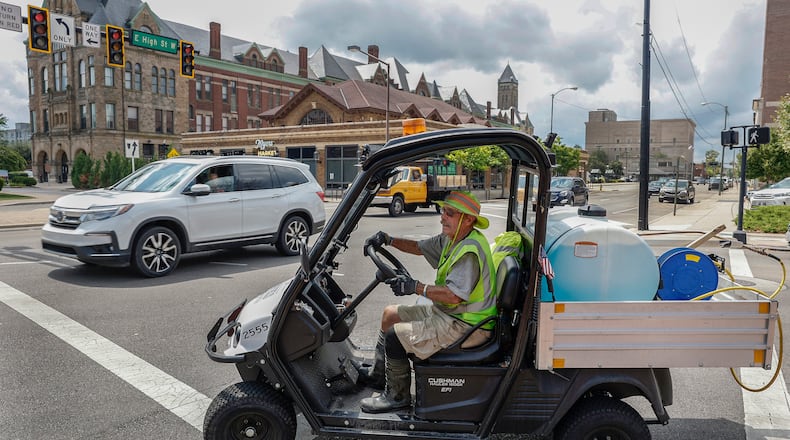Rollins said she asked about people with asylum or asylum status pending and if they should be “safe” from enforcement and was told, “Well, I’m not an immigration attorney but I work with the State Department and I work with immigration attorneys every day and no, they’re not going to be safe here.”
Advocates were told to find a “third country” to help people “self-deport,” Dorsainvil said.
“The thing is, the State Department should be the entity to help us identify that third country, but they’re not helping us well in this area,” Dorsainvil said. “I mean we are living alone in this country, and the thing is it’s so difficult for folks to get back to Chile, Brazil or Canada since those countries make the borders a bit tighter. I don’t know how the logistics (are) going to be to (get) all these folks out of town.”
The Husted representative’s advice was “demonstrative,” Rollins said.
“It was ‘Picture this: Signs on deportation centers everywhere that say self-deport, free plane ticket, thousand dollars when you arrive. This is your only option,’” she said the group was told.
Rollins said they were told that everyone with a pending asylum case would have around a 180-day wait, during which they would be placed in a detention facility.
“We’re fearful of not saying this to people and telling them their rights to know this, but we’re fearful of telling them and creating a panic about this,” Rollins said.
The asylum process can take up to several years, with people often filing their applications or passing a credible or reasonable fear screening before receiving a hearing or asylum interview date years in the future, according to the American Immigration Council. For people with an immigration case granted relief like asylum in fiscal year 2024, most waited an average of more than 1,283 days for their outcome, according to the AIC.
Individuals with asylum applications can obtain work authorization after their case has been pending for at least 180 days in most cases.
Many Haitians who came into the country under the Cuban, Haitian, Nicaraguan, and Venezuelan (CHNV) humanitarian parole program and did not obtain another status lost their jobs when the Department of Homeland Security in June began terminating their statuses. The terminations were appealed, but a district court decision determined those here under humanitarian parole can have their statuses revoked while a lawsuit on the effort plays out.
Temporary Protected Status was initially set to end Feb. 3, 2026 after the Biden administration extended it, but the Department of Homeland Security announced an official termination would happen Sept. 2, 2025, saying that conditions in Haiti had improved and its immigrants no longer meet the conditions for TPS.
A federal judge then ruled that ending TPS was unlawful, blocking the program from ending early. TPS is still set to expire Feb. 3, 2026 as of now.
Haiti continues to be under a level four travel advisory through the state department, with the agency warning against kidnapping, crime, terrorist activity, civil unrest and limited healthcare.
Credit: AP
Credit: AP
Rollins said she believes the conversation with Husted’s office may in part be a pressure campaign to make her and other advocates panic people “so that they can start self-deporting,” but she said with the passage of President Trump’s “Big Beautiful Bill,” the administration can do much more than previously.
The “Big Beautiful Bill” provides more than $170 billion in additional funding for immigration and border enforcement activities to the U.S. Department of Homeland Security, Immigration and Customs Enforcement, Customs and Border Protection and the Department of Defense. The funds are provided through reconciliation and do not include directives on how they must be used, “which prevents members of Congress from conducting meaningful oversight,” according to the AIC.
Credit: AP
Credit: AP
Dorsainvil said he and others are on Capitol Hill this week, lobbying in support of the Dignity Act of 2025, a bill introduced by Florida Rep. Maria Elvira Salazar. The bill aims to strengthen borders, provide immigrants in the country illegally with the opportunity to obtain legal status if they meet certain requirements, and update some parts of the country’s immigration system.
Dorsainvil said he and others are also advocating for TPS to be redesignated, at least to allow those already with the status to continue.
The News-Sun inquired about the nature of the conversation with Husted’s office. According to a Husted spokesperson, all constituents are welcome to share thoughts or concerns when they contact the office. Advocates said Husted’s office asked for the meeting.
“During this meeting, our team met with the local advocates, listened to their concerns, and discussed the group’s TPS designation while emphasizing the importance of having a plan to ensure they are complying with the law and federal regulations,” the spokesperson said.
The spokesperson did not share specifics on the conversation.
About the Author



